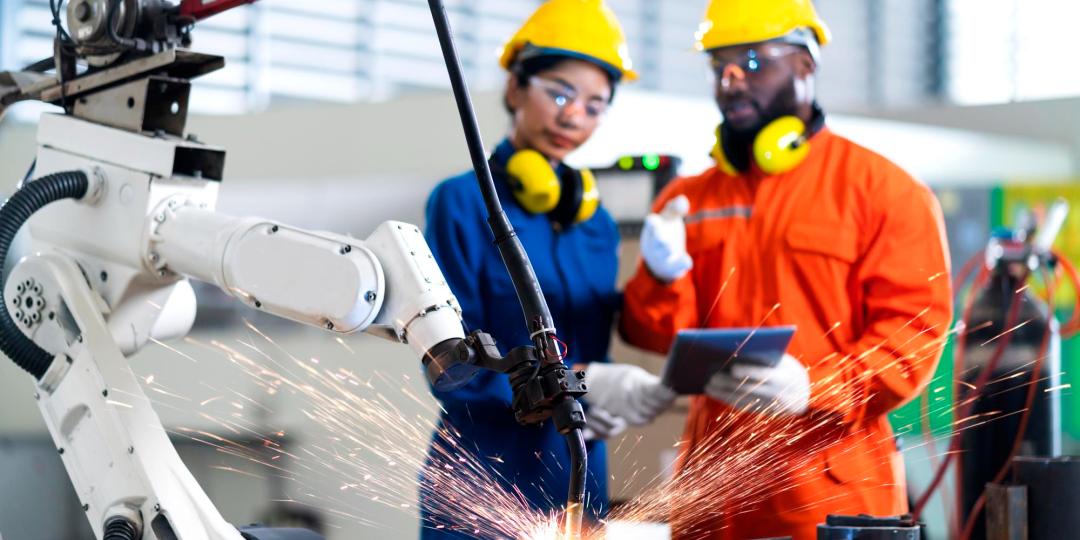South Africa boasts a well-developed manufacturing sector. In 2023, the sector in its entirety provided more than 1.6 million jobs and accounted for 13.0% of South Africa’s gross domestic product (GDP). According to data from Statistics South Africa, the food and beverage sub-sector was the largest contributor to sales (22.3%) in the last quarter of 2023 (October-December), followed by basic iron and steel, non-ferrous metal products, metal products and machinery (20.9%) and petroleum, chemical products, rubber and plastic products (20.1%).
South Africa’s manufacturing sector also carries weight globally. In 2022, the country ranked 51st out of 153 countries in the United Nations Industrial Development Organisation (UNIDO) Competitive Industrial Performance (CIP) Index. This measurement evaluates 153 countries’ capacity to produce and export manufactured goods, their technological progress, and their global influence on manufacturing activity. It placed South Africa—the African continent’s most industrialised economy—within the top third of manufacturing economies globally.
While these achievements and figures are notable, the sector is navigating a complex landscape marked by challenges and opportunities. In PwC’s newly released report, Manufacturing Analysis 2024: Resolute. Resilient. Adaptable., we take a detailed look at the financial and operational performance of South Africa’s major listed manufacturing companies in 2023, and hone in on the key trends and challenges they faced and overcame.
Pieter Theron, PwC Africa Industrials & Services Leader, says: “During the past year, the sector faced significant headwinds driven by an underperforming economy, escalating production costs and logistics disruptions. However, in the face of this, the sector has shown resilience with only a small decrease in overall sales. Key focus areas driving the industry include cost reduction, sustainability, digital transformation, automation and employee reskilling.”
Vinesh Maharaj, PwC South Africa Smart Manufacturing Lead, says: “Between 2023 and 2024, the sector’s total combined revenue declined by 2.53%, masking the sector’s true potential. Net profit dropped significantly by 145.66%, with the speciality chemicals and paper and wood sectors registering losses, while the packaged food sector saw the greatest profit increase. Operating profits decreased across the sector by 21.04%, with the top four contributors to profit also being the top revenue contributors. Based on the poor financial performance and risks identified within the industry, sustainable and cost effective manufacturing is a key future requirement.”
Focus areas for growth
Maintaining and growing the sector involves risks, with business structure, politics and the economy being top concerns for CEOs. Leaders are also aware that skills are the golden thread for organisational success. PwC’s 27th Annual Global CEO Survey in Africa indicates that 45% of CEOs in sub-Saharan Africa are anticipating that labour and skills shortages will have a significant impact on their profitability in the next decade. “Now more than ever, it is imperative for organisations to not only nurture the skills that employees will need throughout their careers, but to further develop workforce skills that will be crucial to achieving business goals and transformation,” says Dr Dayalan Govender, PwC Africa People & Organisation Leader.
Sustainability matters now more than ever
Data from our Voice of the Consumer 2024: South African Findings report also indicates that South African consumers are willing to pay on average 11.9% above the mean product price for sustainably produced or sourced goods. “This signifies that consumers do care about sustainability and are willing to pay more for it,” says Nqaba Ndiweni, PwC Africa Consumer, Industrial Products and Services (CIPS) Industry Leader.
“South African industries have benefited from high carbon intensity and lower export prices, but the Carbon Border Adjustment Mechanism (CBAM) and similar policies will erode this advantage, leading to higher costs, lower demand and increased pressure from EU importers for carbon footprint and sustainability compliance,” Ndiweni says. “However, the CBAM also offers an opportunity for South African manufacturers—it forces them to rethink their business models and embrace a circular economy that minimises waste and maximises resource efficiency.”
Tax as a value driver
Tax plays a critical role in optimising and transforming supply chains in the manufacturing sector. “Embedding tax governance in the supply chain is no longer a compliance exercise—it’s a driver of value,” says Carla Perry, PwC South Africa Tax Reporting & Governance Director. “By strategically managing tax within the supply chain, companies can unlock cash flow, reduce costs and better manage risks associated with supply chain disruptions. Effective tax management also provides flexibility and adaptability needed to navigate evolving tax regulations and economic uncertainties.”
Taking the industry forward
Digital transformation is reshaping the industry, enhancing efficiency, reducing costs and improving product quality. Therefore, the adoption of Industry 4.0 tools and smart factory technologies is what is needed to drive significant improvements in manufacturing efficiency and sustainability. “Overall, the South African manufacturing sector holds significant potential for growth and innovation, provided it can navigate the challenges and leverage the opportunities presented by sustainability, digital transformation and strategic collaboration,” Theron concludes.


